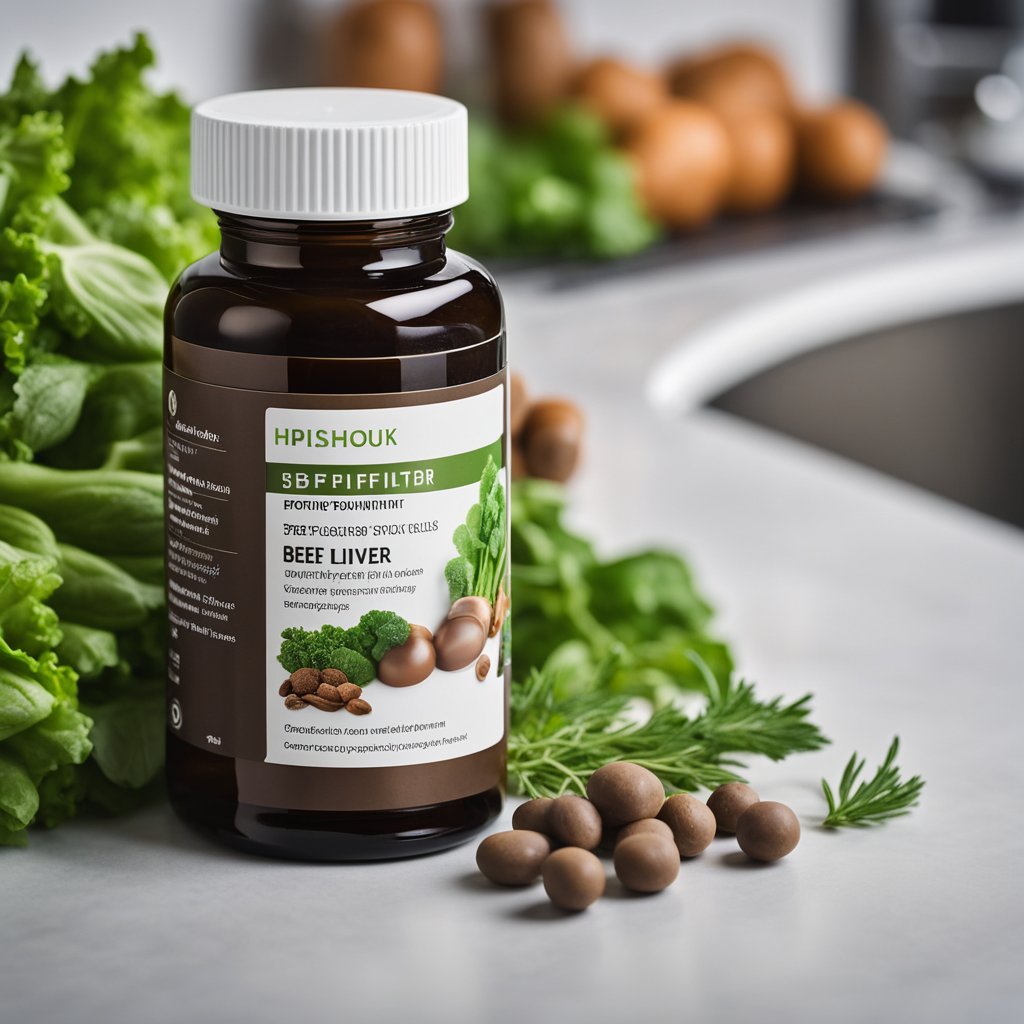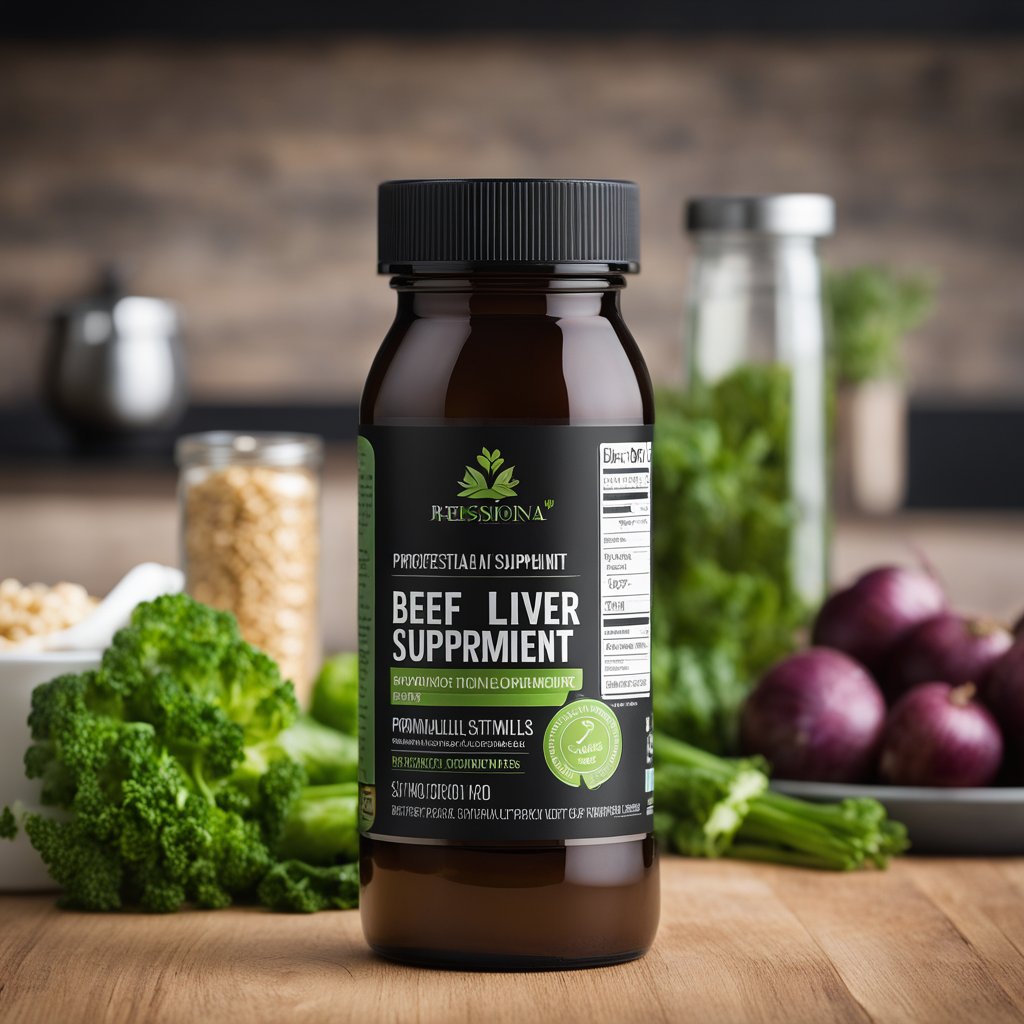Beef liver supplements are rising in popularity as a means to leverage the nutritional benefits of liver without the need to prepare the organ meat itself. Recognized for its dense concentration of vitamins and minerals, beef liver is often hailed as a superfood. Among its nutrients are highly bio-available forms of Vitamin A, essential B vitamins, iron, and various trace minerals, making it an attractive supplement for those looking to enhance their dietary intake.

When seeking out the best beef liver supplements, consumers are confronted with a variety of options, ranging from freeze-dried capsules to powders. Quality is paramount, with the best products being sourced from grass-fed, pasture-raised cattle in pollution-free environments such as New Zealand and Australia. These considerations ensure that the end product is free of unwanted additives and contaminants, maximizing the potential health benefits.
Key Takeaways
- Beef liver supplements provide a concentrated source of natural vitamins and minerals.
- High-quality supplements come from grass-fed cattle and are free from additives.
- Different forms of beef liver supplements are available to suit individual preferences.
Understanding Beef Liver Supplements

Beef liver supplements are gaining attention for their dense nutritional content. I’ll explore their composition and historical significance to provide a clear understanding of their role in supplementation.
What Are Beef Liver Supplements
Beef liver supplements are concentrated forms of the nutrients found in the liver of cattle. Grass-fed and freeze-dried processing methods maintain the integrity of these nutrients. These supplements typically come in capsules or powders and are rich in vitamins and minerals, like significant amounts of Vitamin A, iron, copper, and zinc. They also contain protein and choline, which supports liver function and overall health. The term “desiccated” refers to the drying process that the liver undergoes, making the nutritional attributes shelf-stable.
Grass-fed beef liver, compared to grain-fed, is often preferred for these supplements due to its higher quality and nutrient profile. The ideal grass-fed beef liver supplement provides the benefits of consuming liver without the strong taste that many find unpalatable. Brands like Ancestral Supplements and Vital Proteins offer grass-fed options that are praised for their nutrient-dense profiles.
History and Origin of Beef Liver Supplements
The use of beef liver for its nutritional value is not a new concept; it has a longstanding history in many cultures as a rich source of essential nutrients. The practice dates back to ancient times, where it was understood that organ meats were among the most beneficial parts of an animal to consume. Supplementing with beef liver can be traced back to the traditional practices of ancestral nutrition, where the entirety of an animal was used for sustenance, valuing the liver for its concentration of life-supporting vitamins and minerals.
Today’s beef liver supplements, like desiccated beef liver, pay homage to these ancestral practices by providing a convenient means of consuming the nutrition found in liver. The concept of “like supports like” underpins the philosophy behind ancestral supplements, suggesting that consuming liver supports liver health. This nutrition-focused tradition is carried forward into modern times with the manufacturing of high-quality desiccated liver supplements.
Benefits of Beef Liver Supplementation
In my research and experience, I’ve found that beef liver supplements are highly regarded for their dense nutritional value and array of health benefits. These supplements are especially beneficial for boosting energy and improving skin health due to their rich vitamin and mineral content.
Nutritional Profile and Health Benefits
Beef liver is a nutrient-dense food offering an impressive profile of vitamins and minerals. It’s a substantial source of Vitamin B12, which is vital for maintaining healthy nerve cells and aiding in the production of DNA and RNA. Regular intake of vitamin B12 from supplements can contribute to better energy levels and mood.
B Vitamins in general are well-presented, including niacin, essential for optimal exercise performance and metabolism. The presence of heme-iron, a form of iron that is exceptionally bioavailable, facilitates efficient red blood cell production, boosting both immune system function and energy levels.
Here’s a brief look at the nutrient profile commonly found in beef liver supplements:
| Nutrient | Benefit |
|---|---|
| Vitamin B12 | Supports energy, mental health, and red blood cell production |
| Iron | Enhances oxygen transport and energy |
| Coenzyme Q10 | Aids in energy production and antioxidant protection |
| Copper | Plays a role in immune function and cardiovascular health |
With this wealth of nutrients, I recognize beef liver supplements as a powerhouse for fortifying the immune system and supporting overall health.
Specific Benefits for Skin and Energy Levels
Delving into the specifics, the Skin receives significant attention with beef liver supplementation. The high levels of vitamins, particularly vitamin A and B vitamins, contribute to skin health by promoting cell turnover and acting against oxidative stress, which can lead to clearer and more revitalized skin.
In terms of Energy Levels, the coenzyme Q10 and iron found in beef liver support mitochondrial health and oxygen transport, respectively, which are crucial for maintaining high energy levels throughout the day. An increase in overall vitality is often an early benefit noticed by those starting on beef liver supplements.
I maintain, based on the specific composition of beef liver supplements, that they are invaluable for those seeking to bolster their nutrition, enhance their immune function, and maintain robust energy and a bright mood.
Sourcing and Quality Considerations
Selecting the best beef liver supplement requires careful consideration of the source and the quality of the liver used. In this section, I will guide you through the intrinsic differences between grass-fed and grain-fed beef liver, and address the critical aspects of purity and processing methods.
Grass-Fed vs. Grain-Fed Beef Liver
Grass-fed beef liver originates from cattle that have been raised on pasture diets, while grain-fed counterparts are commonly fed a diet that includes grains. Grass-fed cows, especially from places like New Zealand, are considered superior due to their natural diet which closely mimics what cattle would eat in the wild. It’s widely acknowledged that grass-fed liver boasts higher levels of certain nutrients when compared to grain-fed varieties. Grass-fed beef is also less likely to contain unwanted hormones and pesticides, ensuring a cleaner product.
- Pasture-Raised: Refers to cows that graze on grass.
- Grass-Fed Cows: Specifically refers to a diet of grass, which can impact the nutritional content and purity.
- New Zealand: A country known for high standards of livestock husbandry and grass-fed beef production.
Importance of Purity and Processing Methods
The purity of a beef liver supplement is pivotal. Additives, fillers, and unwanted enzymes can affect the efficacy of the supplement. This is why freeze-dried beef liver is generally preferred, as it preserves nutrients without the need for harmful preservatives.
- Freeze-Dried: A method that helps preserve purity and nutrients.
- Non-Defatted: Liver that has not had its natural fats removed, which can contain important fat-soluble vitamins.
Furthermore, products should be third-party tested to ensure quality and the absence of contaminants. Supplements that are labelled as organic have an added level of assurance that they are free from pesticides and hormones.
- Third-Party Tested: Independent verification of the supplement’s quality.
- Organic: Ensures the product is free from synthetic pesticides and fertilizers.
When choosing a supplement, consider one that uses grass-fed and pasture-raised beef liver to maximize the nutritional benefits. It’s also essential to look for products processed in a manner that preserves the liver’s natural compounds, including essential enzymes and nutrients.
Potential Side Effects and Considerations
In my assessment of beef liver supplements, it’s crucial to understand safe consumption practices and be aware of potential side effects.
Guidelines for Consumption
It’s imperative to adhere to the recommended serving size indicated on the supplement packaging to prevent adverse effects. Exceeding the suggested intake can lead to side effects which may include:
- Vitamin A toxicity, presenting as headaches, dizziness, and blurred vision
- Digestive discomfort, potentially manifesting as temporary changes in bowel movements
- Allergic reactions, though rare, should be acted upon immediately
Pregnant women should be especially cautious, as excessive vitamin A can pose risks during pregnancy.
Considerations for Specific Populations
Specific groups need to be more vigilant when incorporating beef liver supplements into their regimen:
- Individuals with pre-existing liver conditions should consult with a healthcare provider, given the high nutrient concentration in beef liver.
- Those with a history of allergens should review the supplement’s contents for potential allergens to avoid allergic reactions.
- Ensuring that pregnant women receive professional advice helps to avoid complications affecting liver health and pregnancy outcomes.
Consuming beef liver supplements within recommended guidelines can support health, but always consider individual circumstances and consult with a healthcare provider for personalized advice.
Types and Forms of Beef Liver Supplements
Beef liver supplements come in a variety of forms, each offering a different delivery method for the nutrient-rich organ meat. As someone who has researched the topic, I can guide you through the main types and what to look for in additives.
Comparing Capsules, Powders, and Tablets
Capsules: My investigation finds that capsules are a popular form of beef liver supplements, often preferred for their convenience. Typically, these are made from gelatin, though veggie capsules are available. They might contain pure desiccated beef liver powder, which is simply dried and powdered liver, rich in heme iron, vitamins such as B12, and minerals including phosphorus, magnesium, and calcium.
- Pros: Easy to swallow, generally no taste, precise dosage
- Cons: Can have fillers or flow agents; gelatin may be an issue for some
Powders: Beef liver in powder form allows for flexible dosing and can be mixed into foods and drinks.
- Pros: Versatile use, potential cost-effectiveness, lack of additional ingredients
- Cons: Taste may be off-putting for some, less convenient to carry and consume on the go
Tablets: Less common but still available, tablets can sometimes contain additional binders compared to capsules.
- Pros: May offer a slow-release option, compact
- Cons: Can be more difficult to swallow, potentially strong taste
Evaluating Supplement Additives
When I assess beef liver supplements, I pay close attention to additives, which often differentiate high-quality products from lesser ones.
Fillers and Flow Agents: Some supplements include these to aid in manufacturing or to bulk up the product. It’s critical to look for brands that minimize unnecessary additives, maintaining the purity of the beef liver.
- Common Additives: Magnesium stearate (flow agent), cellulose (filler)
Gelatin vs. Veggie Capsules: Gelatin capsules are derived from animal products, which enhances their nutrient profile, but may not suit vegetarians. Veggie capsules offer an alternative for those avoiding animal-derived ingredients.
Overall, tablets, powder, and desiccated beef liver capsules each support energy production differently, and my advice is to consider personal preferences, dietary restrictions, and lifestyle when choosing among them.